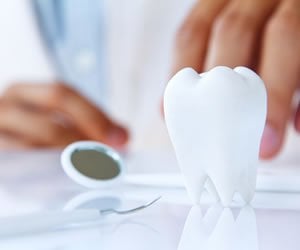Last Updated on June 26, 2022 by Laura Turner
This article is reprinted with permission from the American Student Dental Association. It originally appeared in the Summer 2015 issue of Mouth.
Each year, dental schools across the United States graduate students who were already dentists. Coming from different backgrounds and nations, we are termed IDP, or International Dentist Program, graduates. ID Programs in the U.S. are one of the most incorporating and intensive dental programs around the globe. However, the realization of second graduation involves a different set of struggles that the traditional dental student might not be aware of.
As practicing professionals, we must transition back into student mode to improve our standards. For most of us, this means leaving families, children, or aging parents and paying a fortune to do so.
In the academic setting, the repetition of courses is frustrating. Coupled with the reproach of unsatisfactory scores in subjects we have practiced and excelled in for years, the grind makes us doubt our capabilities as professionals. It is a tedious, mentally taxing task to reorient our standards and protocols, but it makes us resilient. We earn the revered D.M.D/D.D.S with well-rounded minds.
From a personal perspective as well as sentiments expressed by my colleagues, visa status is undoubtedly of highest concern for IDP candidates. Applications for F1/student visas are often met with procedural delays, which can result in students deferring or abandoning the program. This is an anti-climax to the immensely invested-in dreams. Upon graduation, the provision of Optional Practical Training is a decent incentive approved by USCIS-STEM policy. However, while the U.S. Immigration and Customs Enforcement recently approved a 17-month extension for almost all degrees under the science, technology, engineering and math umbrella, dentistry is not included. Termination of the Optional Practical Training means having a new position waiting or ending up jobless. An extended time period allows for better odds of ending up with a close-to-ideal job, but the current system denies us that chance.
A private practice offers autonomy and high earning potential, but a service provider sponsors an H1B visa. While that visa classifies us as work-eligible, the idea of being an employee and generally lower compensation make the decision onerous. The H1B becomes priority, as necessitated by the need for job security and the prospects of a green card.
A survey of 80 IDP candidates from the 2016 graduating class of Boston University estimated that roughly half of the students plan to pursue post-graduate/residency training. The decision to either invest in furthering one’s training or reimburse what was already paid can seem grim. This decision is harrowing for ambitious graduates who deliberately stall plans to either fund postgraduate programs or pursue personal or familial financial stability. Although the prospect of “rapid-earning” right after graduating is attractive, it usually means abandonment of postgraduate dreams.
There is a reason why postgraduate programs are a major goal. With general practice, an appropriate alternative connotation of IDP comes to mind: Internationally Displaced Practitioners. Originally belonging to the nations where one licensing examination suffices for the entire country, practice location is restricted by the regional examination boards. Moving to a new region could add licensure costs on top of moving expenses. The nature of dental boards to demand particular lesions for specific examination periods often requires some “financial reassurance” to ensure an appropriate patient. The initial cost of licensing and persistent renewals can exude financial insatiability.
Despite these hurdles, the ID program has received tremendous following and continued support in the last decade. This is a result of educational and subsequent professional successes. However, many barriers still exist. Some may potentially mar the global reputation of IDP programs for future prospective international dentists.
